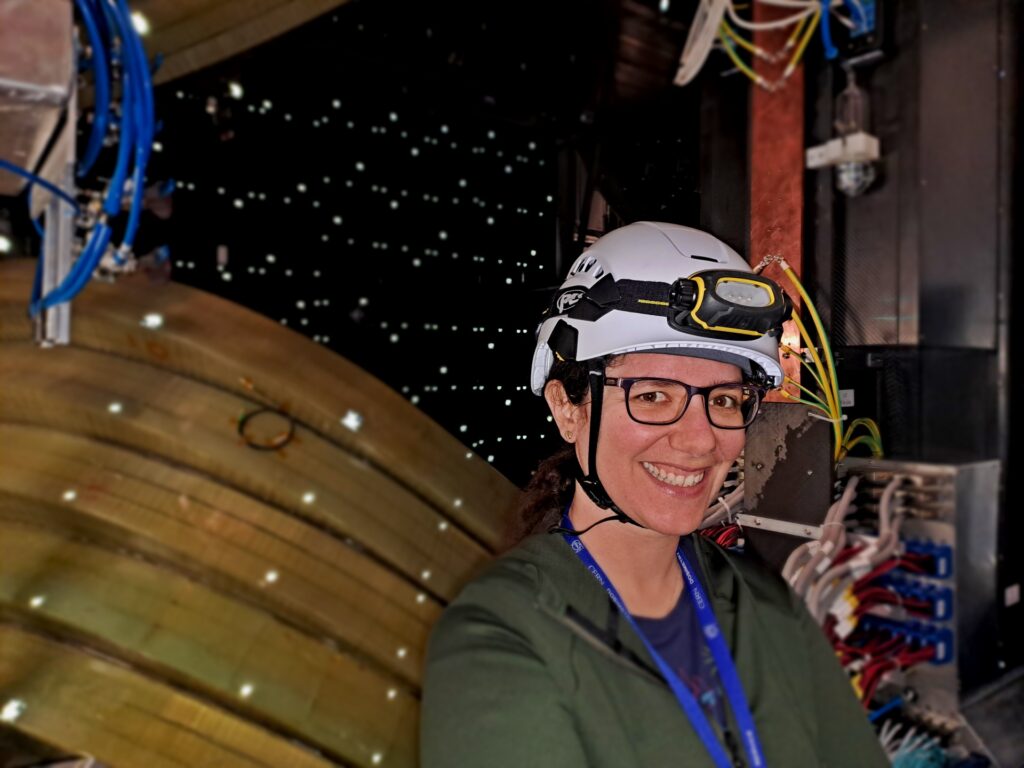The physicist María Vieites Díaz (Ribadeo, 1991), was appointed in June as deputy physics coordinator at the LHCb experiment of the European Organization for Nuclear Research (CERN). The position is one of the most important in this collaboration, which involves more than 1,700 people, including scientists and technicians, from more than a hundred institutions in 22 countries around the world.
Maria’s appointment was announced by the LHCb physics coordinator, Prof. Fred Blanc, from the École Polytechnique Fédérale de Lausanne (EPFL). Starting in 1 August, and for two years, the coordinator and his deputy will work hand in hand to organise the physics-related activities of the experiment. In this position, Vieites will play a key role in guiding the scientific agenda of this collaboration.
The LHCb (Large Hadron Collider beauty) experiment, was designed primarily to carry out measurements related to the study of CP symmetry violation. This is essential to understand the asymmetries between matter and antimatter, and to explain why matter prevails over antimatter in our universe.
Her responsibilities will include supervising the analysis of the data, ensuring the scientific quality of the results and coordinating communication between all the international teams involved in the collaboration.
On her appointment, María Vieites emphasises that “having been chosen for this position is a great honour for me, and I feel very excited and full of energy to face the next two years with this new perspective at LHCb”.
Joining the IGFAE in September 2024
María Vieites’ appointment at LHCb comes at a time when she is about to join the Instituto Galego de Física de Altas Enerxías (IGFAE), in September 2024, as a researcher in the Ramón y Cajal programme, funded by the State Research Agency of the Ministry of Science, Innovation and Universities.
At the IGFAE, a joint research centre of the University of Santiago de Compostela and the Xunta de Galicia, María will join the LHCb research programme, where she will focus on the analysis of the data produced during ‘Run3’ (the new data collection period) and the operation of this CERN experiment. She will also contribute to the development of future technological improvements of the LHCb detector, as well as updating some of the measurements from the previous phases of the experiment (Run 1 and 2) that proved to be powerful tests of the consistency of the Standard Model.
María Vieites studied Physics at the University of Santiago de Compostela, where she obtained her PhD in 2019. She is specialised in the study of the differences in behaviour between matter and antimatter through the analysis of amplitudes in B meson decays in the LHCb experiment at CERN. After her PhD, she joined the École Polytechnique Fédérale de Lausanne (EPFL) in Switzerland as a postdoctoral researcher in the local group of the LHCb collaboration, contributing to the analysis of radioactive decays of B mesons. Maria is currently a Research Fellow at CERN.
About IGFAE
The Instituto Galego de Física de Altas Enerxías (IGFAE) was founded in 1999 with the aim of coordinating and promoting scientific and technical research in the fields of High Energy, Particle and Nuclear Physics, and related areas such as Astrophysics, Medical Physics or Instrumentation. Since its inception, IGFAE staff have participated in some of the world’s largest experimental facilities, such as the Large Hadron Collider (LHC) at CERN. The IGFAE’s scientific work and its international projection have twice earned it recognition as a María de Maeztu Unit of Excellence, awarded by the State Research Agency.
